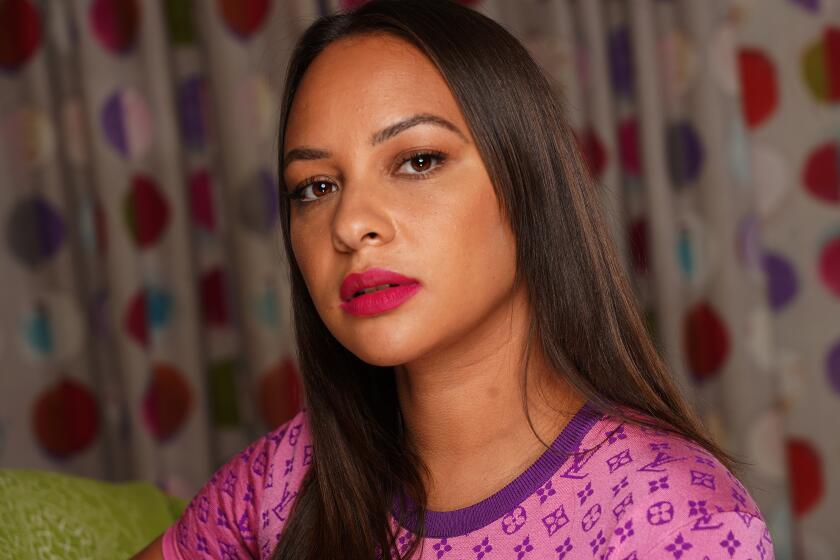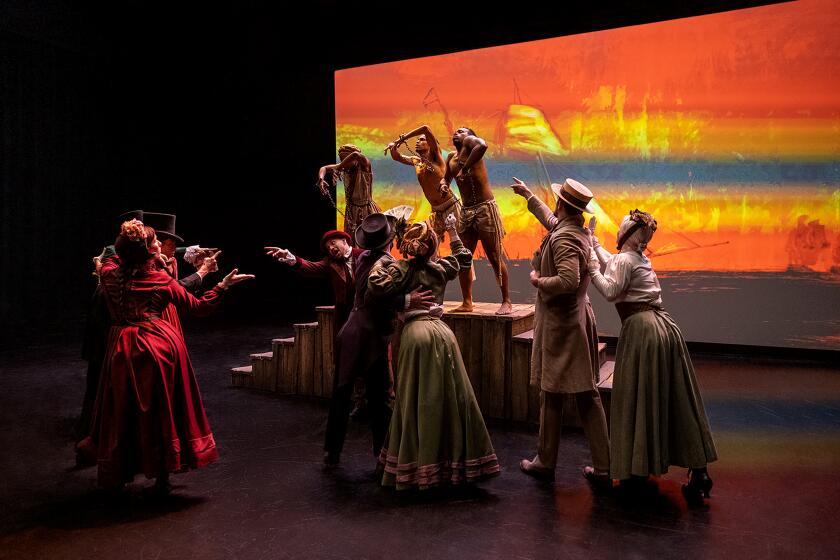‘Blindspotting’ pays homage to ‘Romeo Must Die’ with an action star and Bay Area music
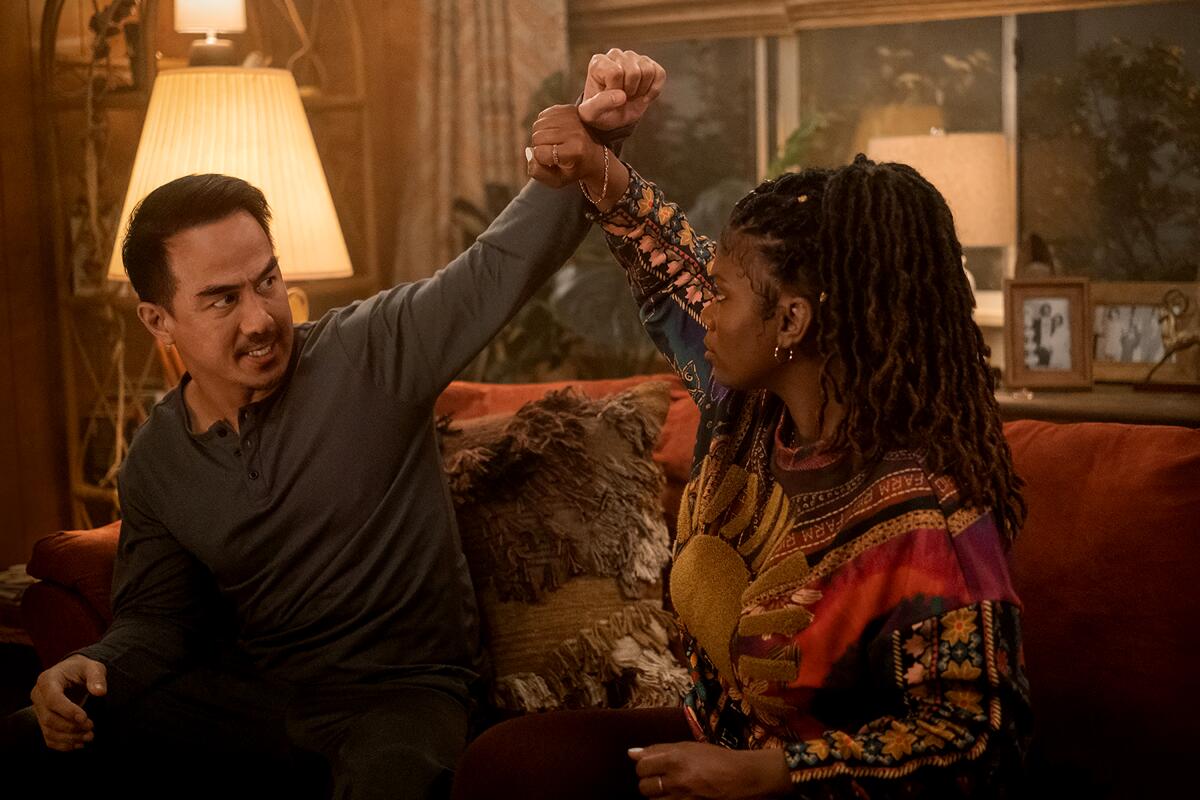
Action star Joe Taslim, best known for his martial arts prowess in movies like “The Raid: Redemption,” “The Night Comes for Us” and “Mortal Kombat,” wears a nervous grin as he bounces around backstage at L.A. Center Studios. It’s March 2022, and he’s flown in from Indonesia to film a guest turn filled with jabs, punches, kicks and surprises for the second season of Starz’s “Blindspotting.”
In Friday’s episode, he’s mostly on the receiving end of those blows as Mustafa, the mystery ex Janelle (Candace Nicholas-Lippman) left behind in Bali after a stint abroad. Taslim has the fight sequences down easy, of course. “But this is the first time I’m doing new things onscreen,” he says with a laugh as we wander the soundstages where the interior shots of the West Oakland homes in “Blindspotting” are filmed. “Usually people cast me to play a character who likes to kill people.”
This role is unlike any Taslim has had before, tailor-made to showcase his action skills, romantic charisma — and hidden musical talents, as glimpsed occasionally in the videos he posts to Instagram, in which he sings ballads at his piano. It’s why the scene he’s about to film, a very unexpected moment in a show full of them, has him uncharacteristically “terrified.”
You would be, too, if you only had a week to arrange and learn a stripped-down R&B cover of “Hope I Don’t Go Back” by Vallejo rap legend E-40 — and perform it on keyboard, singing live for the cameras, on a show that bleeds Bay Area love. “I hope I don’t go back to slangin’ yayo ...” he starts crooning in a soft falsetto before stopping with a laugh. “Does [Mustafa] even know what ‘yayo’ is?” Taslim wonders aloud.
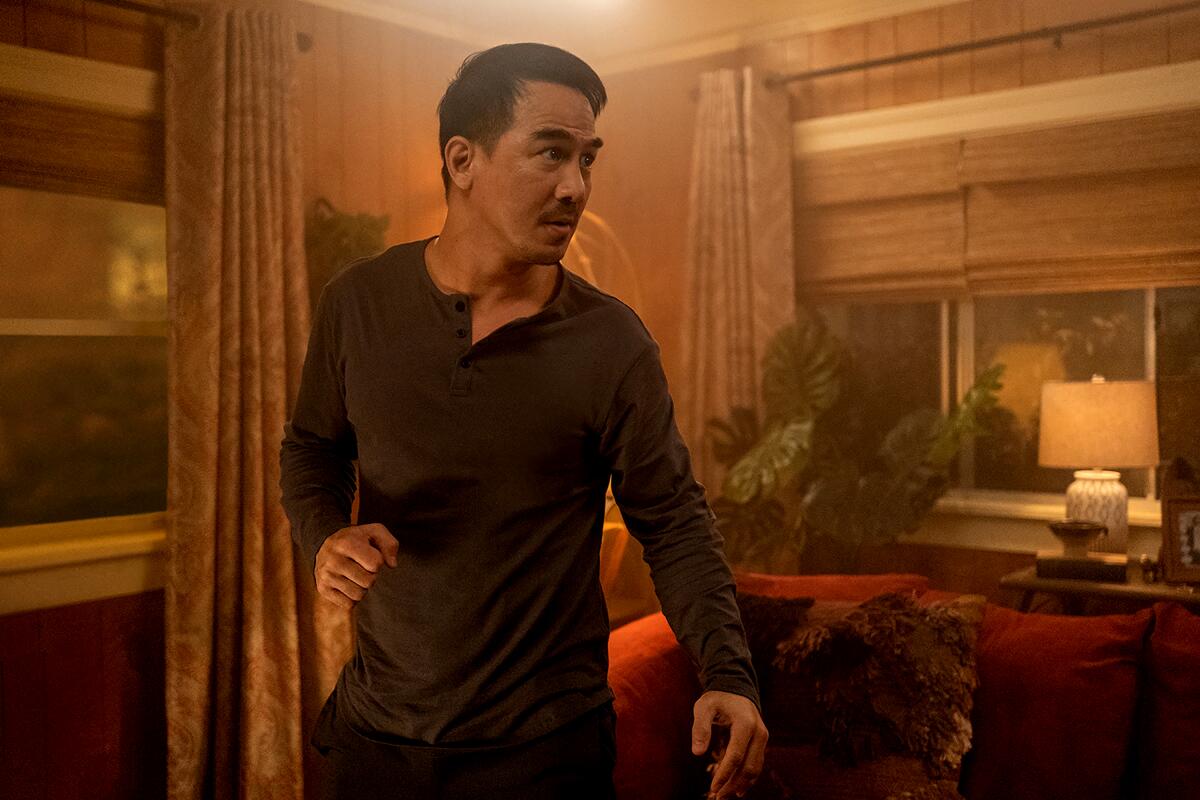
“It was the funniest song for him to learn that only a Bay girl would love,” says star and showrunner Rafael Casal, before the first take reveals whether or not Taslim nailed the assignment. “[‘Hope I Don’t Go Back’] is such a romantic song. Then we found out that Joe could sing and play piano and thought, ‘This would be so amazing. He can fight and serenade? Perfect.’”
The TV series is a spinoff from the 2018 film of the same name that Casal, alongside Daveed Diggs, wrote, produced and starred in. No other show is telling stories quite like this lyrical Bay Area ensemble dramedy. The series itself is a bold pivot from the film that switches the focus from its protagonists, Miles (Casal) and Collin (Diggs), to the women in their lives — wives, friends, sisters, mothers. They carry the story forward, examining how the prison industrial complex shapes the lives, loves, hopes and dreams of a tightknit circle of friends and family in the Bay Area.
The Oakland-raised creators of Starz’s new series, based on the 2018 film, know residents are liable to argue over its “validity.” They’re ready.
“Blindspotting” the series centers on Miles’ partner, Ashley (Jasmine Cephas Jones), who is raising their young son, Sean (Atticus Woodward), solo while he serves time at San Quentin. The second season fast-forwards nine months, as Ashley is quietly suffering under the strain of separation while her friends and family deal with their own complicated lives.
Last season teased a sweet flirtation between Janelle and the kind-hearted aspiring chef and parolee Earl (fellow cast breakout and writer Benjamin Earl Turner). But pairing them romantically would have been a disservice to both characters, says Casal. “Sometimes when you’re getting feedback from the internet like, ‘Get them together!’ and you’re like, ‘F— y’all, that’s for sure not what we’re going to do,’” he says.
Instead, the creative team sent Earl down his own path, where he is fighting the trauma of recidivism and rebuilding ties to his past. His distance this season has led Janelle to reconnect with Mustafa, the previously unseen husband she left at the start of the series. And their reunion opens old wounds, morphing into a living-room sparring match in what Casal calls “our ‘Love & Basketball’ episode.”
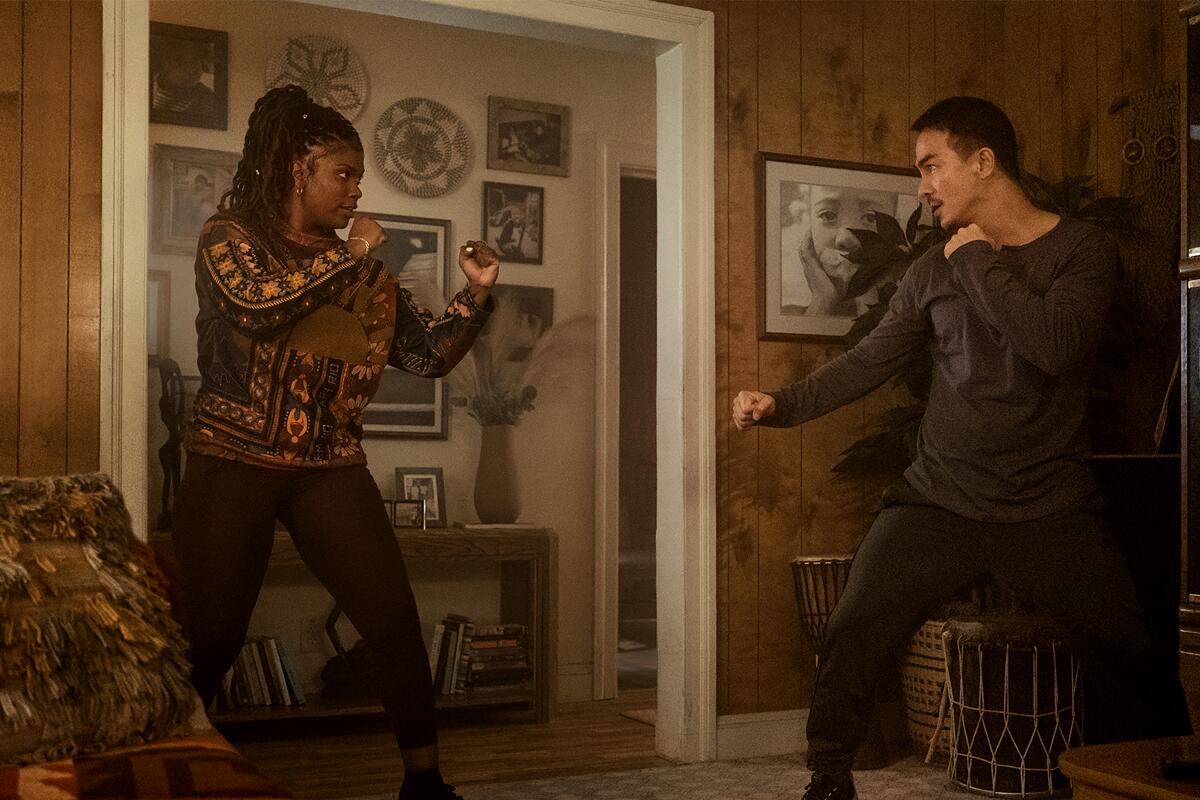
Sitting between setups with Margo Hall, who plays Janelle’s mother, Nancy, Nicholas-Lippman smiles as she recounts the week’s shooting schedule: fighting Taslim, being serenaded by Taslim, excavating Janelle’s guarded emotions and, most importantly, demonstrating her own versatility in her first action scene. It’s an idea she sparked in a meeting with the writers between seasons, expressing her desire to do stunts, which brings her one step closer to her dream of landing a Marvel movie.
“I’m really going toe to toe with Sub-Zero?” says Nicholas-Lippman of the martial arts fight for Janelle’s heart. “This is crazy.”
In the stylistically daring world of “Blindspotting,” where a recurring Greek chorus of street dancers and direct-address spoken-word interludes weave threads of magical realism into its West Oakland setting, why not work out the troubles of modern romance with a little hand-to-hand combat?
“There’s choreographed fight sequences, love, dance numbers. It really does have everything,” says director Blackhorse Lowe (“Reservation Dogs”) of the episode, written by Obehi Janice, which also finds Ashley exorcising her demons during a wild night out. “It’s them flirting and getting out of their baggage and realizing they still really love each other. There’s a nice arc to that.”
I want young girls and women to see me and say, “That’s me — Janelle is my mom, my sister, my cousin.”
— Candace Nicholas-Lippman
For a show set in one of the most racially diverse regions in the U.S., the introduction of Janelle’s Indonesian beau is meaningful because it’s not often seen, says Nicholas-Lippman. “It’s very rare that you see this kind of love story between an African American woman and an Asian man,” she says. “I’m all about representation as the chocolate woman on the show. I want young girls and women to see me and say, ‘That’s me — Janelle is my mom, my sister, my cousin.’ And also see that this kind of love story is possible.”
Their romance channels another action-packed, Oakland-set love story. “This is ‘Romeo Must Die 2!’” says Taslim, referencing the 2000 martial arts action film starring Jet Li and the late pop star Aaliyah. “I love that movie so much,” he says. “My dream is that someday, Hollywood will make another badass action romance with Asian and Black stars together.”
“Romeo Must Die” redux, however, has a major difference: Whereas Li and Aaliyah‘s characters kept things platonic onscreen, Mustafa and Janelle do share a smooch. “I’m so nervous,” says Nicholas-Lippman, smiling. “I got to kiss Sub-Zero!”
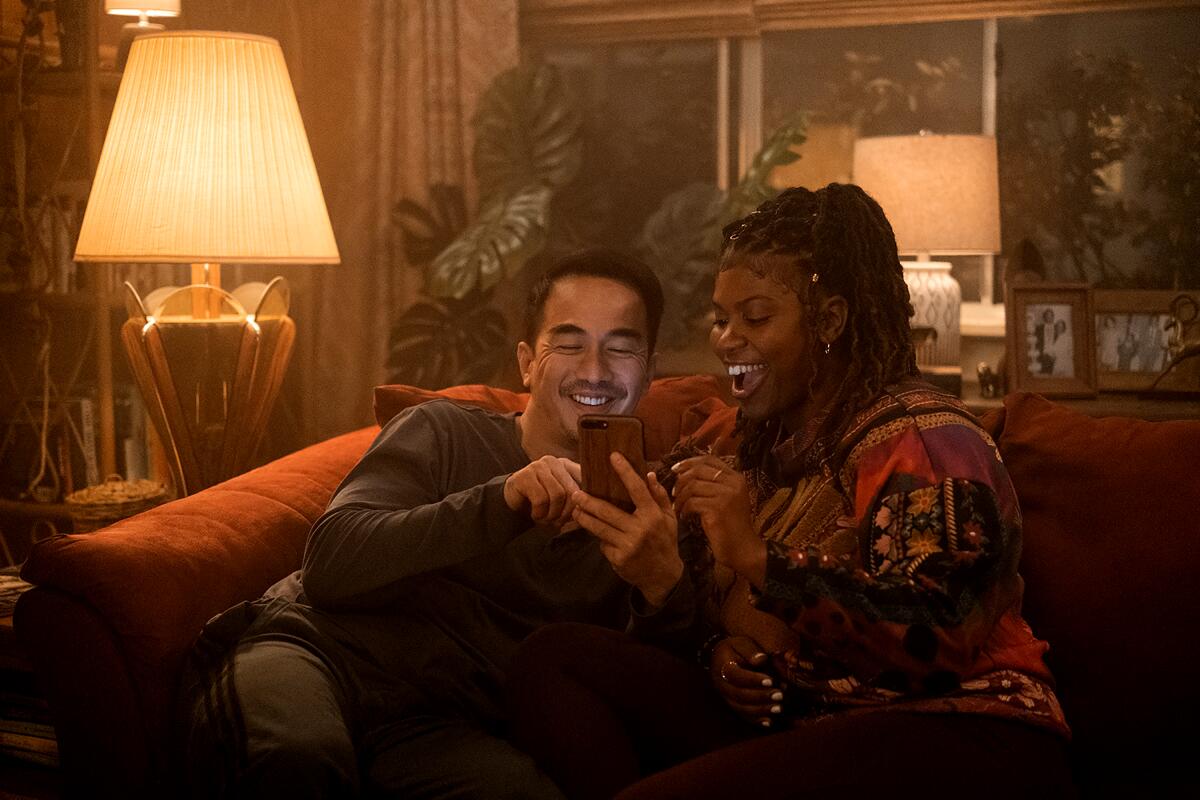
“Blindspotting,” like the feature film it’s adapted from, is a love letter to the vibrant East Bay communities where Casal and Diggs met and grew up. It features the people that populate the region but don’t see themselves onscreen in Hollywood movies and TV shows, and the rich culture that springs from the Bay. Building off an Independent Spirit-nominated debut season, the show leans into its origins and idiosyncrasies even more, filming between Los Angeles and in and around Oakland.
Already in Season 2, the show has taken viewers on a train ride of pure imagination at Tilden Park in Berkeley; introduced Sean’s larger-than-life monster buddy, Thizzly Bear (a Jim Henson’s Creature Shop creation); convinced Bay Area legend Too Short to play himself — and act out a fictional existential crisis over his favorite word; and brought back Pittsburg, Calif.-born Dante Basco, whom you may remember from “Hook,” on another winking cameo set at a Filipino house party in Daly City, with appearances by rappers P-Lo and Ruby Ibarra.
Expect “Blindspotting” to expand its geographical boundaries as the characters take iconic field trips outside of the 510. “I guess we’ll spark the new debate on our show of whether or not Santa Cruz is the Bay,” teases Casal. “Which it is not.”
Elsewhere in this episode, the local landmark Luka’s Taproom & Lounge, which shuttered last January after 18 years due to skyrocketing rent, is commemorated. It serves as the backdrop to Ashley’s questionable decisions, just as it did to joyful moments for the characters and, not so long ago, the creators themselves. “Every Friday and Saturday, we were there,” says Casal of the beloved Uptown venue.
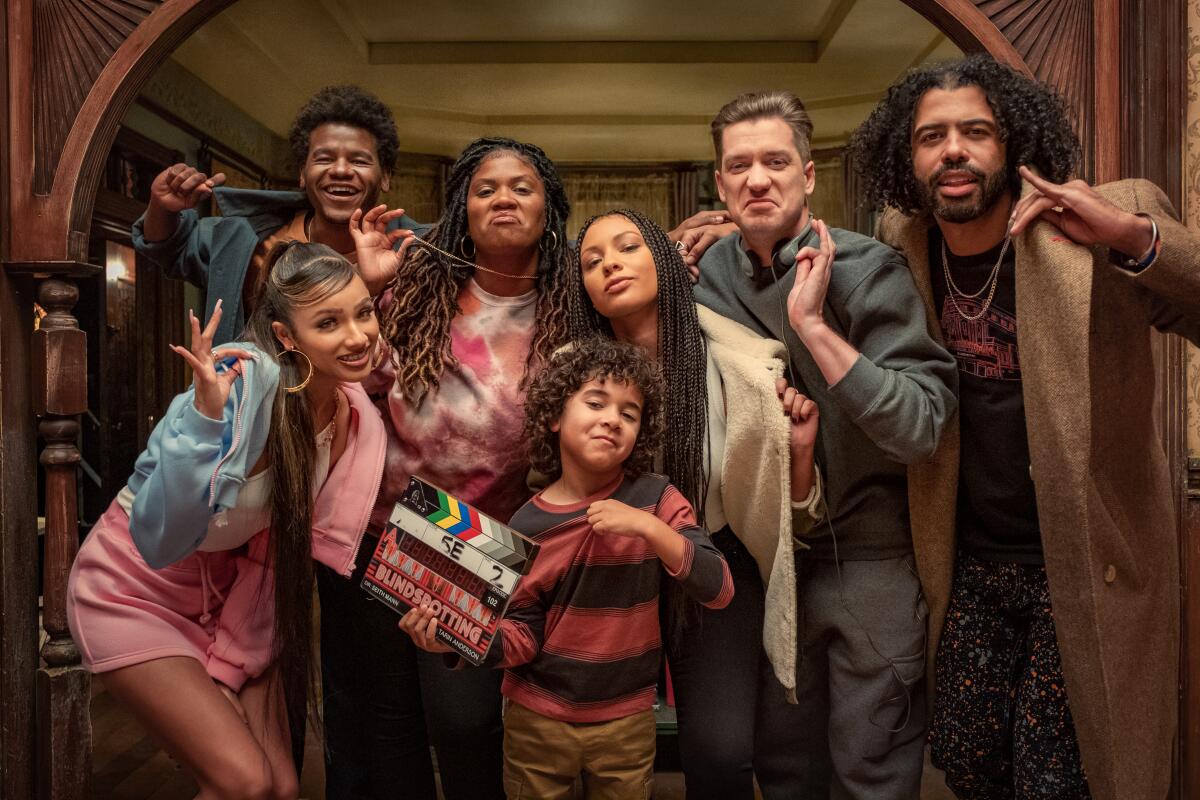
“We tried in this season to do episodes that could only exist on this show,” says Keith Calder, an executive producer alongside Jess Wu Calder. (They also produced the film.) One example is in Episode 3, which was Wu Calder’s directorial debut, where Ashley and Miles teach Sean about the history of anti-Black racism in America. The lesson is translated onscreen via a powerful fantasy dance sequence led by choreographer Jon Boogz.
More ambitious flights of fancy are to come in the weeks ahead as the series tries to push the bounds of the format. It’s a challenge to explore the ways the prison system affects not only those incarcerated, but also their loved ones, in the span of eight 30-minute episodes.
In Screen Gab no. 82, we catch up on one of TV’s most audacious shows, hear from the showrunners behind ‘Lucky Hank,’ offer recommendations and more.
“The reality is that there is no Band-Aid for a family getting broken apart,” says Casal. Ashley is dealing with mental health struggles, and several characters are on disparate paths, including Janelle; Earl; Miles’ sister, Trish (Jaylen Barron); and his mother, Rainey (Helen Hunt). Their stories are informed by people Casal and his co-creators know who have had similar experiences with or adjacent to incarceration.
“My closest relationships to this story are friends and family members, men who’ve been in prison, and my secondary relationships with the people that they hold close to them — watching them and seeing them try to wrestle with it,” says Casal, who directs four episodes, including the Season 2 finale slated for May 26. “I’ve had more conversations with people who’ve been incarcerated, and even those conversations are ... a minefield. There’s so much there that you just don’t get.”
The goal of the show is to always “present people as human [and] not lose the flawed people at the core of it,” he says. “The enemy is still always the institution. But you don’t make a show where the enemy is the institution and then to contrast it, [you] make all the characters have perfect judgment. The fun has been dialing in: How much flawed morality do we afford characters?”
‘Blindspotting’
Where: Starz
When: Friday 9 p.m.
Streaming: Starz.com
Rating: TV-MA (may be unsuitable for children under the age of 17)
More to Read
The complete guide to home viewing
Get Screen Gab for everything about the TV shows and streaming movies everyone’s talking about.
You may occasionally receive promotional content from the Los Angeles Times.
